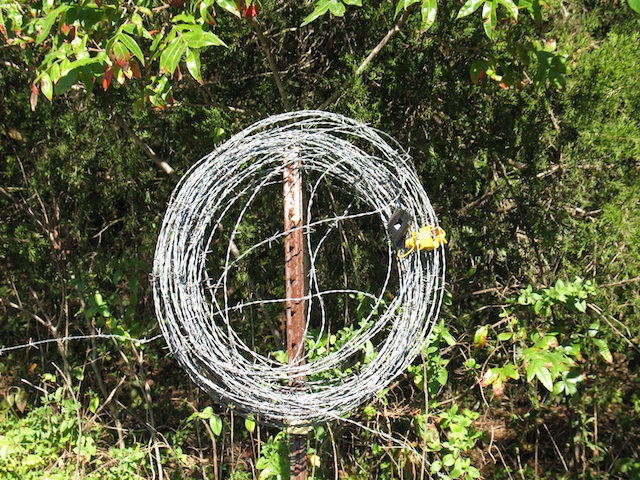| ||||||||||
Dr. Ronald P. Rogers CHIROPRACTOR Support for your body's natural healing capabilities 270-384-5554 Click here for details 


Columbia Gas Dept. GAS LEAK or GAS SMELL Contact Numbers 24 hrs/ 365 days 270-384-2006 or 9-1-1 Call before you dig Visit ColumbiaMagazine's Directory of Churches Addresses, times, phone numbers and more for churches in Adair County Find Great Stuff in ColumbiaMagazine's Classified Ads Antiques, Help Wanted, Autos, Real Estate, Legal Notices, More... 
|
Kentucky Color: Farmers Wreath Kentucky Color: Farmers Wreath Click on headline for full essay with photo(s) By Billy Joe Fudge, Retired District Forester Kentucky Division of Forestry I came upon the "Farmers Wreath" in the accompanying photo, recently, while exploring in the far reaches of the Great Wooded South. This wreath is constructed from barbed wire but not just your run of the mill barbed wire. The barbed wire used in this wreath is known around these parts as Japanese barbed wire. Regular, humane barbed wire is primarily manufactured in the United States. It is pliable, not stiff, and somewhat soft when compared to its Japanese counterpart. It is biodegradable, in other words it will rust and deteriorate over time and is used by compassionate farmers who would like to use plank or woven wire fencing but just can't afford it. Japanese barbed wire has been in use in the Great Wooded South for about 50 years. It is constructed of a secret formula, high tech metal alloy. Whole sections of this evil menace to livestock, wildlife and mankind have been discovered coiled up on the ground in the same spectacular condition it would have been on the store shelf 50 years earlier. Yes, it is indeed nearly indestructible. The barbs are sharpened to a razor's edge and some who have suffered near fatal attacks from Japanese barbed wire say that they were standing several paces away when they would suddenly be overcome by the wire. I know it sounds impossible but years of extensive research in secret, Great Wooded South laboratories have determined that the metal has a memory and will seek to recoil into the original shape of the roll as soon as tension is released which often happens when a wire will break. Furthermore, recent declassified documents reveal that the wire was banned by the Geneva Conventions as an impoundment material for prison camps, prisons and the like. Since Japanese barbed wire was banned, the more humane razor-wire has become a less than adequate substitute. Billy Joe Fudge, Vice-president, Homeplace on Green River, Inc., Retired District Forester, Kentucky Division of Forestry 270-250-2239 This story was posted on 2012-09-29 08:58:42
Printable: this page is now automatically formatted for printing.
Have comments or corrections for this story? Use our contact form and let us know.
More articles from topic Kentucky Color by Billy Joe Fudge:
Kentucky Color: I don't believe Kentucky Color - Kentucky Color Anniversary Weekend Kentucky Color - The Taming of Dug Hill. Complete now Kentucky Color - False Solomon's Seal Kentucky Color - Dogwood Prelude to Autumn and Winter Kentucky Color - Trumpet Vine Feast Kentucky Color - Bull Nettle Kentucky Color: Blackberries and Bears Kentucky Color - Eye of Debby Kentucky Color - Big Tooth Aspen View even more articles in topic Kentucky Color by Billy Joe Fudge |



|
||||||||
|
| ||||||||||
|
Quick Links to Popular Features
Looking for a story or picture? Try our Photo Archive or our Stories Archive for all the information that's appeared on ColumbiaMagazine.com. | ||||||||||
|
Contact us: Columbia Magazine and columbiamagazine.com are published by Linda Waggener and Pen Waggener, PO Box 906, Columbia, KY 42728. Please use our contact page, or send questions about technical issues with this site to webmaster@columbiamagazine.com. All logos and trademarks used on this site are property of their respective owners. All comments remain the property and responsibility of their posters, all articles and photos remain the property of their creators, and all the rest is copyright 1995-Present by Columbia Magazine. Privacy policy: use of this site requires no sharing of information. Voluntarily shared information may be published and made available to the public on this site and/or stored electronically. Anonymous submissions will be subject to additional verification. Cookies are not required to use our site. However, if you have cookies enabled in your web browser, some of our advertisers may use cookies for interest-based advertising across multiple domains. For more information about third-party advertising, visit the NAI web privacy site.
| ||||||||||

















































